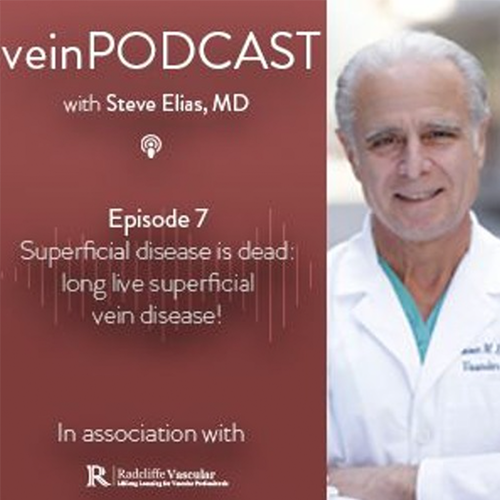
Superficial vein disease is a relatively non-harmful disease that significantly affects a patient’s quality of life. Major risk factors include genetics, multiple pregnancies and a job with a lot of standing. More prevalent in females and often aggravated by poor lifestyle choices such as smoking and obesity, it’s a disease that is difficult for physicians to prevent or control.
So, is superficial disease dead or not?
Join Dr Steve Elias for this provocative discussion with a world-renowned expert panel: Prof Alun Davies (Imperial College London, UK), Ellie Dillavou, MD, (Duke Regional Hospital, US), Dr Margaret Mann (Innova Dermatology, US), and Dr Lowell Kabnick (NYU Vein Center, US) to discuss the issues surrounding superficial vein disease, with a focus on treatment options and technologies.
In this episode they discuss:
[03.00] Should we prevent superficial vein disease: part 1?
[05.25] How good are we at treating superficial vein disease?
[07.10] What are we best at treating in vein disease?
[10.25] Spider veins: treatment and technologies. Are we happy with results?
[19.02] Varicosity treatment: should we be looking for new types?
[27.00] The perfect catheter devices.
[33.12] Should we try to prevent superficial vein disease: part 2?
Listen now for the latest episode from the veinPODCAST series.
Prefer video? View vodcast video episode.
Hosted by @DrSteveElias and produced by Radcliffe Vascular. Follow us on social media for the latest updates on the next episode @RadcliffeVASCU today!
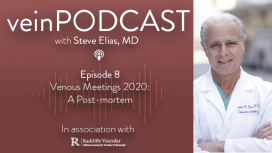
Will a phoenix rise from the ashes and what will future congress sessions look like in the future?
Non-societal representatives, Manjit Gohel (Charing Cross), Jose Almeida (IVC), Antonio Gasparis (Venous Symposium), Nicos Labroupoulos (EVM) and Prof Frank Veith (VEITH), join the discussion today to examine the issues impacting venous meetings in 2020.
Listen to them discuss the impact that COVID-19 has had on society meeting attendance this year and what’s been learnt about hosting meetings as a result. Hear them discuss the pros and cons of virtual meeting attendance and their thoughts around the challenges of postponement and reinvigoration, as they consider what the future might hold for education in 2021/22.
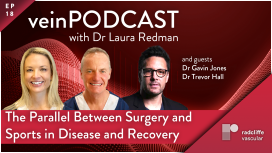
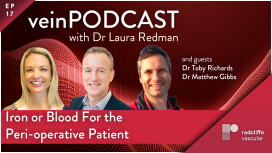
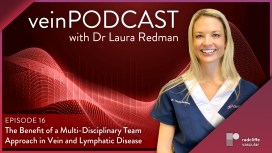



In this week's episode, host Dr Laura Redman considers the darker side of medicine to discuss whether venous disease is being treated for the right reasons and is joined by panellists, Prof Lowell Kabnick (Vascular Surgeon, US) and Dr Muhammed Zaki Shaik (Life Mount Edgemont Hospital, SA) who together discuss this topical issue with consideration for treating C2 varicose veins, venous ulcers and venous insufficiency.

This month's episode hosted by veinPODCAST's new anchor, Dr Laura Redman (Vascular Surgeon, Cape Town, SA) features guests Prof Håkan Brorson (Plastic Surgeon, Malmö, Sweden) and Suzie Davey (Occupational/Lymphoedema Therapist, SA) to discuss issues surrounding primary and secondary lymphoedema in patients.
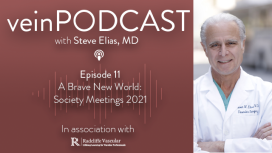
In this month’s podcast episode, Steve Elias, MD is joined by executive directors from The American Venous Forum, The American Vein and Lymphatic Society, The Society of Vascular Surgery and The Society of Interventional Radiology, who together look at the current challenges for the future of society meetings and consider the steps they are taking to work towards a ‘new normal’.
In this session, they debate and discuss suggestions for innovation, as well as new engagement strategies, as they hope to embark on society meetings in a ‘Brave New World’.
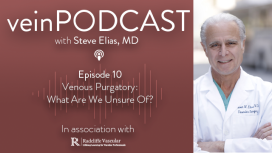
This month’s episode is ‘the podcast with all the questions but not all of the answers’ as Steve Elias, MD, and his expert guest panel including Mark Meissner, Raghu Kolluri, Manu Aggarwal and Tom O’Donnell consider the interesting questions in the grey zones of venous disease. Hear them discuss the unknowns around techniques, technology, diagnostics, therapeutics and education in venous disease and how there is so much more to understand in this exciting field of medicine.
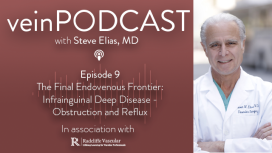
In this latest veinPODCAST episode, Steve Elias, MD, meets with an expert panel to discuss Infrainguinal Deep Venous Disease from many aspects including reflux, post-thrombotic and obstructive disease. They consider what can be done now to help patients with current knowledge and available technology and what is needed to further support treatment of this condition in the future?










